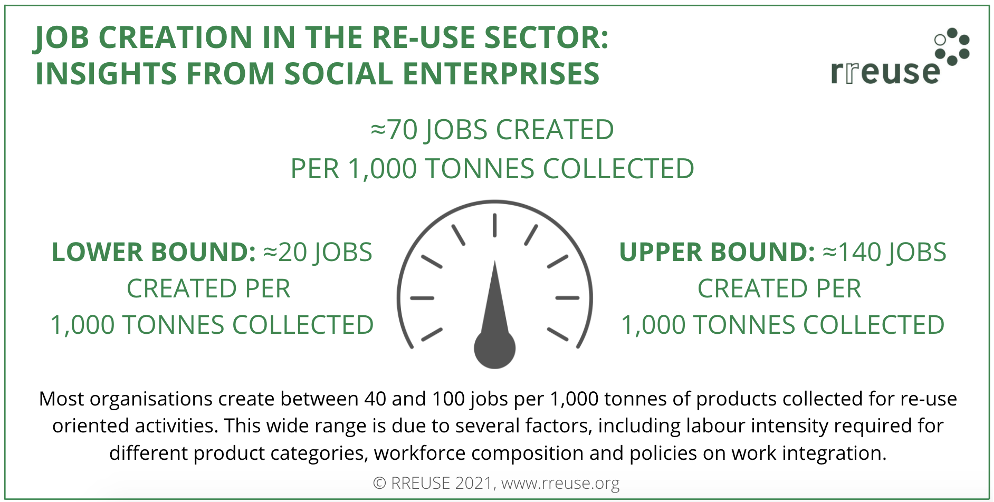The Circular Economy Action Plan estimates that the number of jobs linked to the circular economy in the EU grew by 5% between 2012 and 2018[1]. Yet, there remains gaps in research and in public understanding regarding how the circular economy can provide quality and inclusive jobs.
This briefing outlines the value that social economy enterprises bring to the circular economy in terms of job creation, focussing on the upper levels of the waste hierarchy, notably re-use and preparation for re-use activities. Social enterprises are crucial for a just and green transition towards a resilient low-carbon economy, given their activities to curb the use of resources whilst providing local and inclusive employment opportunities and services.
The majority of statistics contained in this briefing are based on RREUSE’s annual member survey for the year 2019 and several semi-structured interviews. The figures were collected from 27 RREUSE members – mainly national and regional networks of social enterprises – as well as more than 30 individual social enterprises from RREUSE’s wider network. The consolidated data concerns social and environmental performances of social enterprises active in the circular economy, allowing for temporal and spatial data comparisons.
On average, a social enterprise creates 70 jobs per 1,000 tonnes collected with a view of being re-used. Taking into consideration the variety and contextual specificities of activities associated with re-use, social enterprises create between 20 and 140 jobs 1,000 tonnes collected with a view of being re-used, with the majority of them situated within a range of 40 to 100 jobs per 1,000 tonnes.
This briefing focuses on the indicator of total job contracts[2] per 1,000 tonnes collected with a view of being re-used[3]. It serves as a means to shed light on the labour-intensive nature of the circular economy, with a special focus on the re-use sector. It is hoped that these statistics, coupled with further support and research interest into social value and job creation by European policies and programmes, could better support inclusive circular jobs now and in the future. Additionally, it should provide better understanding on the impact social enterprises have in our society.
The ultimate aim of this contribution is to provide food for thought to policymakers when reflecting on strategies stimulating an inclusive and job-rich recovery linked to the implementation of the Circular Economy Action Plan as well as the formulation of an EU Action Plan for the Social Economy.
Further insights into common circular activities, focussed on textiles, electronics and multi-household product re-use are also explored given their relevance to waste prevention policies as well as the EU’s Sustainable Product Policy Framework, including a future EU Strategy for Textiles and Circular Electronics Initiative.
[1] European Commission (2020) Circular Economy Action Plan (Available here)
[2] Data reported in this briefing refers to overall jobs created or “total employment contracts”, which must be distinguished from the indicators “total people engaged” (which includes volunteers and unpaid trainees) and “total FTE employment” (which measures the full-time equivalent of the total amount of jobs created).
[3] In the re-use sector, products are collected for re-use, but not all of the items collected actually make it to being sold after the sorting processes. That’s why this briefing focuses on overall collected tonnes and not tonnage of second-hand products sold or donated.


